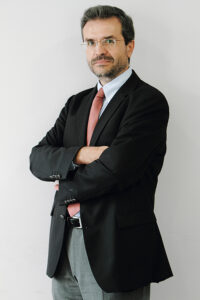The Covid-19 pandemic is a disruption in our everyday lives taken straight out of a book: It has affected all countries, all economies, all industries, all of us, and in an (almost) identical way.
 The Covid-19 pandemic started unexpectedly and out of nowhere, developed incredibly fast, spread rapidly from one country to the next, expanded exponentially, and disrupted everything. At the same time, it inserted distance in many aspects of our lives and accelerated dramatically the digitization of our activities and the digital transformation of the state, organizations, and companies. We learned to work remotely, to purchase products online, to study remotely, to social distance ourselves. And this is only the beginning. Until yesterday, many of the technological changes echoed sci-fi scenarios, yet today, some of them define reality. In essence, digitalization is rapidly disrupting social rules and models and is transforming everyday life. And the Covid-19 pandemic is accelerating this digitalization even more.
The Covid-19 pandemic started unexpectedly and out of nowhere, developed incredibly fast, spread rapidly from one country to the next, expanded exponentially, and disrupted everything. At the same time, it inserted distance in many aspects of our lives and accelerated dramatically the digitization of our activities and the digital transformation of the state, organizations, and companies. We learned to work remotely, to purchase products online, to study remotely, to social distance ourselves. And this is only the beginning. Until yesterday, many of the technological changes echoed sci-fi scenarios, yet today, some of them define reality. In essence, digitalization is rapidly disrupting social rules and models and is transforming everyday life. And the Covid-19 pandemic is accelerating this digitalization even more.
We must dare to challenge existing knowledge
We are living in a non-linear age, the present being dramatically different from the past and, of course, the future. How we live and how we work is never going to be the same again, and the skills we need are completely different with business models evolving and developing but also being disrupted in unpredictable ways. Digital transformation becomes the new reality, and changes are exponential and discontinuous—therefore disruptive. Established social norms and habits are disrupted, and we realize, not before long, that our skills are limited and become devaluated equally fast.
At the same time, it becomes evident that the effective management of the post-Covid-19 disruption largely depends on the cooperation of the majority of society, where mentalities and our culture appear to matter more than our limited skills.
Our answer to the new reality: learning and the way we understand learning! We all need those capabilities and skills that will allow us to learn under specific circumstances and then apply the lessons to an entirely different set of circumstances. This mentality requires the ability to collect models from one context/framework and apply them to a different one, so as to understand and interpret a reality that we have not encountered in the past. Our response to the new data/input is directly related to our ability to learn, adapt and fit in effectively to completely new environments. We must dare to challenge existing knowledge, have the motive to search for new knowledge, the humility to acknowledge what we do not know, and, lastly, the agility to learn and to adapt to the new reality.
Our abilities for continuous learning as well as adapting ourselves and our knowledge are important in life. The creation of a continuous learning culture is crucial in order for us to rise up to the challenges of the Digital Era while maintaining human values and virtues and getting value from being human.
The real challenge of the Digital Era is to acquire the mentality for continuous learning. To approach learning and knowledge systematically, through academic education as well as through novel and innovative forms and learning processes (executive education, learning cycles, digital learning, etc.)—this is where the new normal lies.





